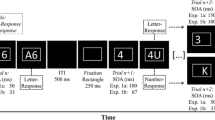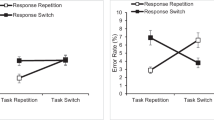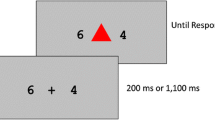Abstract
In the voluntary task-switching paradigm, participants are required to randomly select tasks. We reasoned that the consistent finding of a repetition bias (i.e., participants repeat tasks more often than expected by chance) reflects reasonable adaptive task selection behavior to balance the goal of random task selection with the goals to minimize the time and effort for task performance. We conducted two experiments in which participants were provided with variable amount of preview for the non-chosen task stimuli (i.e., potential switch stimuli). We assumed that switch stimuli would initiate some pre-processing resulting in improved performance in switch trials. Results showed that reduced switch costs due to extra-preview in advance of each trial were accompanied by more task switches. This finding is in line with the characteristics of rational adaptive behavior. However, participants were not biased to switch tasks more often than chance despite large switch benefits. We suggest that participants might avoid effortful additional control processes that modulate the effects of preview on task performance and task choice.


Similar content being viewed by others
Notes
Age from one participant was missing.
In all experimental task display blocks with preview, for example, it is possible that participants worked on a task before they actually selected a task. Indeed, separate analyses for choice and execution reaction times (RTs) in Experiment 1 indicated that participants in the preview conditions worked on task stimuli before they selected a task. This was reflected in longer choice RTs and correspondingly shorter execution RTs in the preview conditions compared to the baseline conditions. These analyses provided further support for our approach to use the sum of task choice and task execution reaction times as a measure for task performance.
We noticed that one participant of this preview group had very high switch costs in the experimental (Δ switch costs = 567 ms), but not in the baseline task display condition (Δ switch costs = −21 ms). This participant was not excluded from our reported analyses, but we conducted additional analyses for the execution-preview group without this participant. These analyses still revealed no reliable effects on mean RTs (all ps > .113) and the difference in repetition rates between the baseline and experimental task display blocks was still significant (p = .013).
References
Allport, D. A., Styles, E. A., & Hsieh, S. (1994). Shifting intentional set: Exploring the dynamic control of tasks. In C. Umilta & M. Moscovitch (Eds.), Attention and performance XV (pp. 421–452). Cambridge, MA: MIT press.
Anderson, J. R. (1990). The adaptive character of thought. Hillsdale, NJ: Lawrence Erlbaum.
Arrington, C. M. (2008). The effect of stimulus availability on task choice in voluntary task switching. Memory and Cognition, 36(5), 991–997.
Arrington, C. M., & Logan, G. D. (2004). The cost of a voluntary task switch. Psychological Science, 15(9), 610–615.
Arrington, C. M., & Logan, G. D. (2005). Voluntary task switching: Chasing the elusive homunculus. Journal of Experimental Psychology. Learning, Memory, and Cognition, 31(4), 683–702.
Arrington, C. M., & Reiman, K. M. (2015). Task frequency influences stimulus-driven effects on task selection during voluntary task switching. Psychonomic Bulletin and Review, 22(4), 1089–1095.
Arrington, C. M., Reiman, K. M., & Weaver, S. M. (2014). Voluntary task switching. In J. Grange & G. Houghton (Eds.), Task switching (pp. 117–136). Oxford, UK: Oxford University Press.
Arrington, C. M., & Weaver, S. M. (2015). Rethinking volitional control over task choice in multitask environments: Use of a stimulus set selection strategy in voluntary task switching. The Quarterly Journal of Experimental Psychology, 68(4), 664–679.
Baddeley, A. (1996). Exploring the central executive. Quarterly Journal of Experimental Psychology: Human Experimental Psychology, 49(1), 5–28.
Brüning, J., & Manzey, D. (2017). Flexibility of individual multitasking strategies in task-switching with preview: Are preferences for serial vs. overlapping task processing dependent on between-task conflict? (manuscript under revision).
Demanet, J., & Liefooghe, B. (2014). Component processes in voluntary task switching. The Quarterly Journal of Experimental Psychology, 67(5), 843–860.
Demanet, J., Verbruggen, F., Liefooghe, B., & Vandierendonck, A. (2010). Voluntary task switching under load: Contribution of top-down and bottom-up factors in goal-directed behavior. Psychonomic Bulletin and Review, 17(3), 387–393.
Dignath, D., Kiesel, A., & Eder, A. B. (2015). Flexible conflict management: Conflict avoidance and conflict adjustment in reactive cognitive control. Journal of Experimental Psychology. Learning, Memory, and Cognition, 41(4), 975–988.
Dunn, T. L., Lutes, D. J., & Risko, E. F. (2016). Metacognitive evaluation in the avoidance of demand. Journal of Experimental Psychology: Human Perception and Performance, 42(9), 1372–1387.
Fischer, R., & Dreisbach, G. (2015). Predicting high levels of multitasking reduces between task interactions. Journal of Experimental Psychology: Human Perception and Performance, 41(6), 1482–1487.
Gray, W. D., Sims, C. R., Fu, W. T., & Schoelles, M. J. (2006). The soft constraints hypothesis: A rational analysis approach to resource allocation for interactive behavior. Psychological Review, 113(3), 461–482.
Hoffmann, J., Kiesel, A., & Sebald, A. (2003). Task switches under Go/NoGo conditions and the decomposition of switch costs. European Journal of Cognitive Psychology, 15(1), 101–128.
Janssen, C. P., & Brumby, D. P. (2015). Strategic adaptation to task characteristics, incentives, and individual differences in dual-tasking. PLoS One, 10(7), e0130009.
Jersild, A. T. (1927). Mental set and shift. Archives of Psychology. Whole No. 89.
Kiesel, A., Steinhauser, M., Wendt, M., Falkenstein, M., Jost, K., Philipp, A. M., & Koch, I. (2010). Control and interference in task switching—a review. Psychological Bulletin, 136(5), 849–874.
Koch, I. (2001). Automatic and intentional activation of task sets. Journal of Experimental Psychology. Learning, Memory, and Cognition, 27(6), 1474–1486.
Koch, I., & Allport, A. (2006). Cue-based preparation and stimulus-based priming of tasks in task switching. Memory and Cognition, 34(2), 433–444.
Kool, W., & Botvinick, M. (2014). A labor/leisure tradeoff in cognitive control. Journal of Experimental Psychology: General, 143(1), 131–141.
Kool, W., McGuire, J. T., Rosen, Z. B., & Botvinick, M. M. (2010). Decision making and the avoidance of cognitive demand. Journal of Experimental Psychology: General, 139(4), 665–682.
Liefooghe, B., Demanet, J., & Vandierendonck, A. (2009). Is advance reconfiguration in voluntary task switching affected by the design employed? The Quarterly Journal of Experimental Psychology, 62(5), 850–857.
Mayr, U., & Bell, T. (2006). On how to be unpredictable evidence from the voluntary task-switching paradigm. Psychological Science, 17(9), 774–780.
Meiran, N. (1996). Reconfiguration of processing mode prior to task performance. Journal of Experimental Psychology. Learning, Memory, and Cognition, 22(6), 1423–1442.
Meiran, N. (2000). Reconfiguration of stimulus task sets and response task sets during task switching. In S. Mosell & J. Driver (Eds.), Control of cognitive processes: Attention and performance XVIII (pp. 377–400). Cambridge, MA: MIT Press.
Meiran, N., Chorev, Z., & Sapir, A. (2000). Component processes in task switching. Cognitive Psychology, 41(3), 211–253.
Nickerson, R. S. (2002). The production and perception of randomness. Psychological Review, 109, 330–357.
Questienne, L., van Dijck, J.-P., & Gevers, W. (2017, May 15). Introspection of Subjective Feelings Is Sensitive and Specific. Journal of Experimental Psychology: Human Perception and Performance (advance online publication).
Rapoport, A., & Budescu, D. V. (1997). Randomization in individual choice behavior. Psychological Review, 104(3), 603–617.
Reissland, J., & Manzey, D. (2016). Serial or overlapping processing in multitasking as individual preference: Effects of stimulus preview on task switching and concurrent dual-task performance. Acta Psychologica, 168, 27–40.
Rogers, R. D., & Monsell, S. (1995). Costs of a predictable switch between simple cognitive tasks. Journal of Experimental Psychology: General, 124(2), 207–231.
Schneider, D. W. (2015). Isolating a mediated route for response congruency effects in task switching. Journal of Experimental Psychology. Learning, Memory, and Cognition, 41(1), 235–245.
Umemoto, A., & Holroyd, C. B. (2016). Exploring individual differences in task switching: Persistence and other personality traits related to anterior cingulate cortex function. Progress in Brain Research, 229, 189–212.
Vandamme, K., Szmalec, A., Liefooghe, B., & Vandierendonck, A. (2010). Brief Reports: Are voluntary switches corrected repetitions? Psychophysiology, 47(6), 1176–1181.
Vandierendonck, A., Demanet, J., Liefooghe, B., & Verbruggen, F. (2012). A chain-retrieval model for voluntary task switching. Cognitive Psychology, 65(2), 241–283.
Vandierendonck, A., Liefooghe, B., & Verbruggen, F. (2010). Task switching: Interplay of reconfiguration and interference control. Psychological Bulletin, 136(4), 601–626.
Wickens, C. D., Gutzwiller, R. S., & Santamaria, A. (2015). Discrete task switching in overload: A meta-analyses and a model. International Journal of Human-Computer Studies, 79, 79–84.
Yeung, N. (2010). Bottom-up influences on voluntary task switching: The elusive homunculus escapes. Journal of Experimental Psychology. Learning, Memory, and Cognition, 36(2), 348–362.
Acknowledgements
This research was supported by grants within the Priority Program, SPP 1772 from the German Research Foundation (Deutsche Forschungsgemeinschaft, DFG), Grant no. KI1388/8-1 and Grant no. DI 2126/1-1. We are grateful to Iring Koch, Dietrich Manzey and Starla Weaver for many helpful comments on an earlier version of the article. We also thank Julia Haimerl and Jonas Maus for the support in data collection. Raw data are available via the Open Science Framework at https://osf.io/tp87f/.
Author information
Authors and Affiliations
Corresponding author
Ethics declarations
Conflict of interest
The authors declare that they have no conflict of interest.
Ethical standards
All procedures performed in studies involving human participants were in accordance with the ethical standards of the institutional and/or national research committee and with the 1964 Helsinki Declaration and its later amendments or comparable ethical standards.
Informed consent
Informed consent was obtained from all individual participants included in the study.
Rights and permissions
About this article
Cite this article
Mittelstädt, V., Dignath, D., Schmidt-Ott, M. et al. Exploring the repetition bias in voluntary task switching. Psychological Research 82, 78–91 (2018). https://doi.org/10.1007/s00426-017-0911-5
Received:
Accepted:
Published:
Issue Date:
DOI: https://doi.org/10.1007/s00426-017-0911-5




